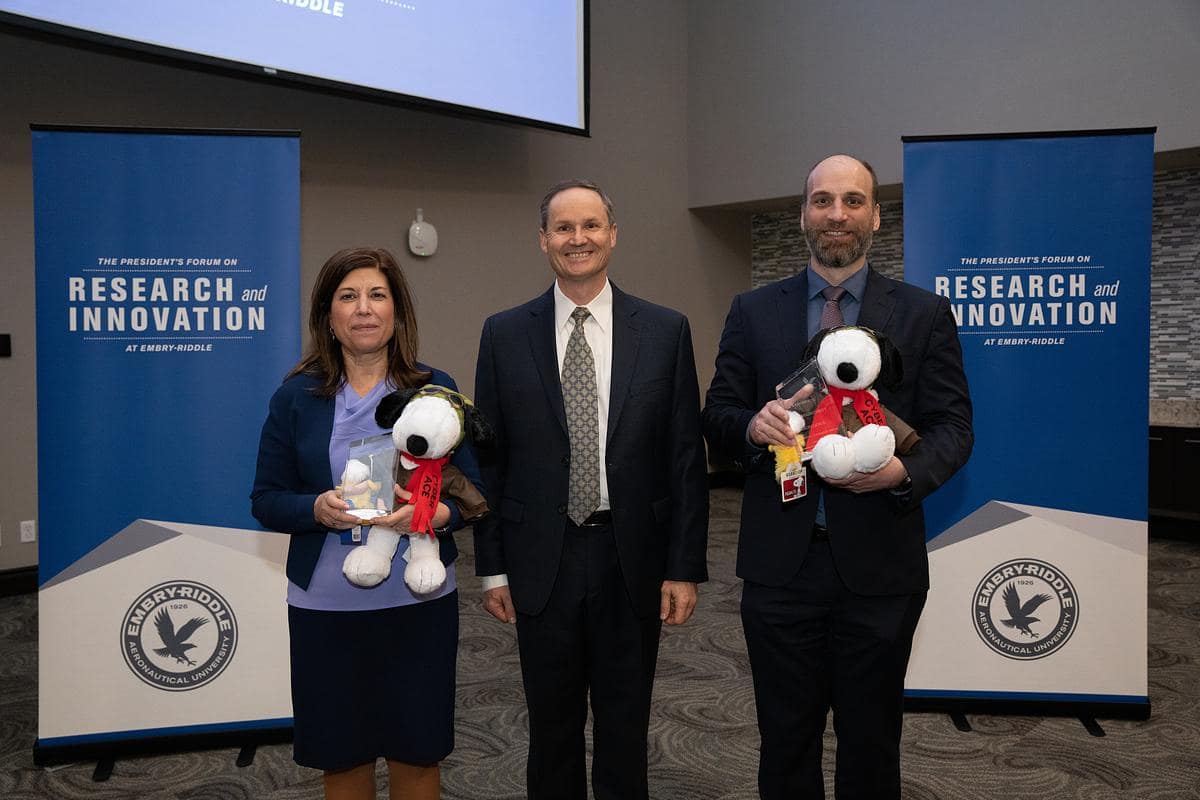Two Leaders Honored at Cybersecurity Symposium

Luci Holemans and Stefan Schwindt have received ACE (Aerospace Cybersecurity Excellence) Leadership Awards, recognizing their global leadership in efforts to combat cybersecurity threats in aviation and aerospace. The awards were announced on Feb. 6 at Embry‑Riddle Aeronautical University at an event that brought together the top experts in cyber resilience.
Participants at “The President’s Forum on Research and Innovation at Embry‑Riddle: Symposium on Aviation and Aerospace Cyber Resilience” included experts from leading companies such as GE Aerospace, Boeing, Airbus, United Airlines, Collins Aerospace, and government organizations, including the FAA, the U.S. Department of Defense, U.S. Department of Homeland Security and NASA, among many others.
Dan Diessner, executive director of Embry-Riddle’s Center for Aerospace Resilient Systems, thanked Holemans for “the years of strong leadership that you bring to our aviation and now space cybersecurity community, as the FAA Air Traffic Organization (ATO) Executive Technical Advisor on Cybersecurity, through your cybersecurity leadership on our United Nations International Civil Aviation Organization (ICAO) panels, and most recently in your efforts supporting the U.S. Space Force Cyber & Spectrum Operations Command.”
Holemans has worked for the FAA for 27 years, having started her career with the U.S. Navy, testing GPS receivers for military aircraft by evaluating in simulated environments how the receivers reacted to spoofing and jamming. Transferring to the FAA, she helped lead the organization's Telecommunications Infrastructure (FTI) program, transitioning more than 6,000 telecommunications services to FTI on schedule and below budget. Throughout that process, she oversaw pioneering developments of security requirements and cybersecurity testing. Subsequently, she led the development of ICAO telecommunications standards and coordination of telecommunications services between the United States and regions abroad. In 2016, Holemans established and led the Air Traffic Organization Cybersecurity Group to strengthen the cybersecurity posture of the National Airspace System. In 2023, she performed a six-month detail supporting the U.S. Space Force Cyber & Spectrum Operations Command at the Pentagon. She currently serves as the FAA ATO Executive Technical Advisor for Cybersecurity and as the vice chair of the ICAO Cybersecurity Panel, promoting both domestic and international initiatives to strengthen the cybersecurity posture and resiliency of the global aviation ecosystem.
Schwindt is a senior principal for aviation cybersecurity at GE Aerospace. He works with organizations around the world, establishing a regulatory framework and associated standards for the aviation industry. Schwindt is also involved in industry research programs. At GE, he supports the organizational and product security strategy and works to ensure that GE Aerospace businesses and their product lines are secure and resilient. He worked in reliability and safety engineering, environmental engineering, system engineering and certification -- at multiple levels and involving civil and military aerospace products, as well as ground and sea military assets — before arriving at his current function in production security.
“Dr. Stefan Schwindt continues to provide critical technical leadership across our global aviation cybersecurity industry and regulatory efforts, including as chair of the Aerospace Industries Association Civil Aviation Cybersecurity Subcommittee, support to both FAA and European Union Aviation Safety Agency regulatory framework and compliance standards, and as a technical cyber expert for our global United Nations ICAO panels and associated Standards and Recommended Practices development efforts,” Diessner said.
In a welcome letter, Embry‑Riddle President P. Barry Butler, Ph.D., underlined the importance of cross-disciplinary cybersecurity efforts in the world of aviation and aerospace, as aircraft become more connected and autonomous, airports and airline operators increasingly employ big data and artificial intelligence, and increasing numbers of satellites are being launched.
"In this ever-evolving landscape, multidisciplinary response teams encompassing industry, academia, government and military are crucial. Collaborative discussions are needed on real-time detection of cyberattack anomalies and creating a timely, proactive, interoperable standard for information security," Butler said. "We look forward to lively and candid exchanges over the next two days, as presenters and panelists tackle key concerns in the field of aerospace and aviation cyber resilience."

 Michaela Jarvis
Michaela Jarvis